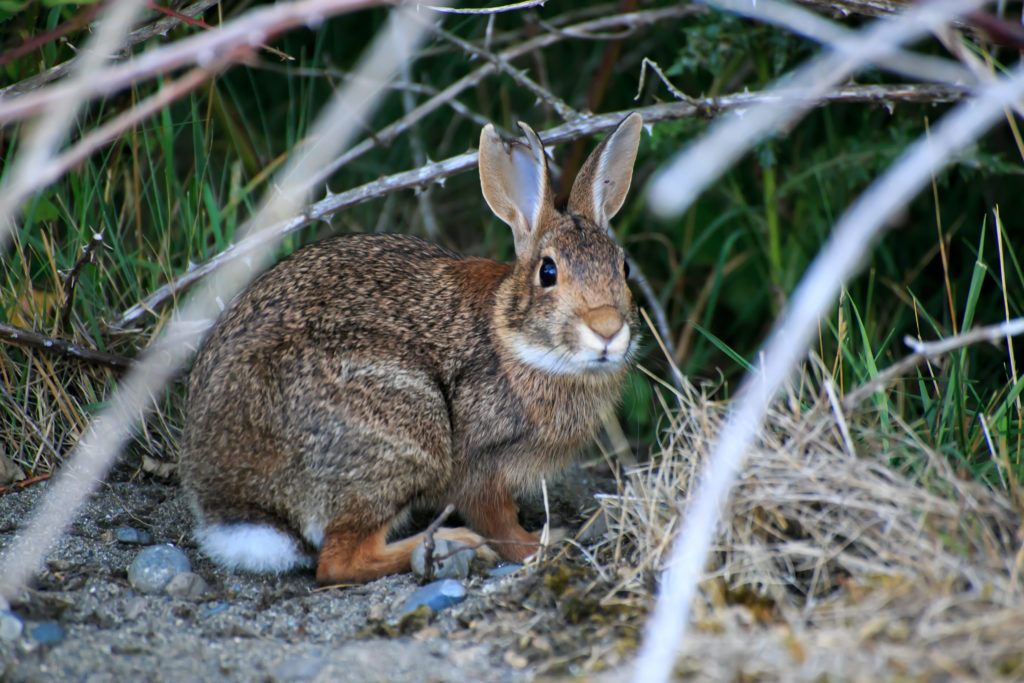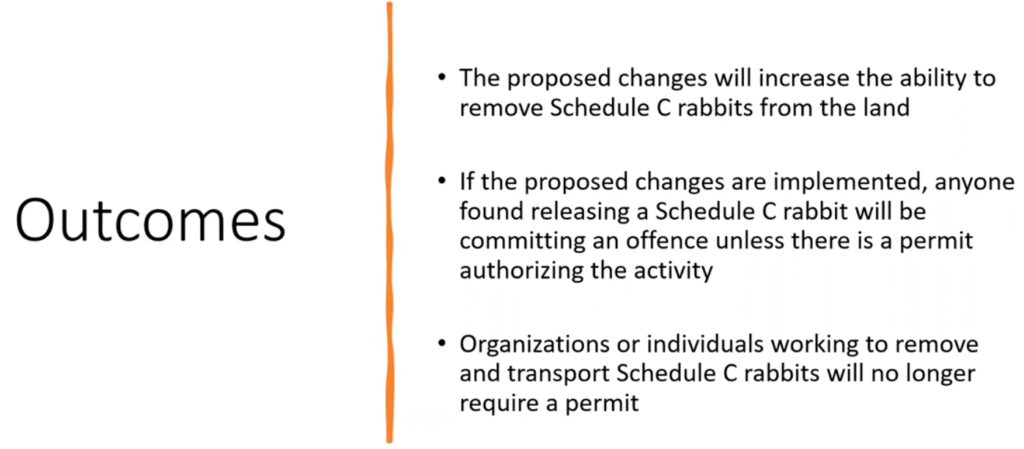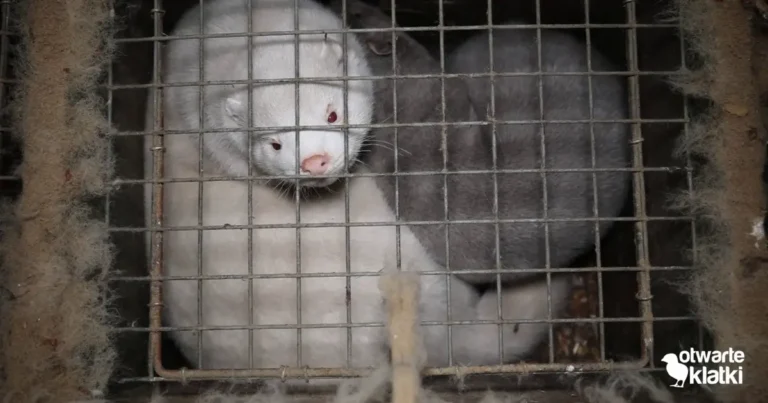
The Fur-Bearers has learned of incoming changes to Wildlife Act regulations that will weaken already poor protections in place for European and Eastern Cottontail Rabbits in the province. The new changes will make it even easier to remove these species from the land.
These rabbits are categorized as Schedule C species in the Wildlife Act Designation and Exemption Regulation, which under section 9, are already exempted from various protections under the Wildlife Act. These species are listed as “invasive mammals” by the government. European rabbits are not wild and are commonly kept as companion animals, however their offspring are often released as ferals. Cottontail rabbits are wild and are not suitable to be kept in captivity.
A webinar hosted by the Invasive Species Council of BC features a presentation from the Ministry of Forests, outlining details of the proposed changes and the government’s intended outcomes. Click here to view the webinar page.
The below screenshot from the presentation shows that the government intends on making it easier to remove (i.e. capture and/or kill) rabbits from the landscape.

The Fur-Bearers has not been consulted on these changes and we are extremely concerned about consequences that may result from them. While we support changes that crack down on rabbit dumping (it is already illegal to abandon pets in BC) and make it easier for rehabbers and rescue organizations to capture and care for rabbits, we are worried that there may be harmful unintended and intended consequences of these changes:
- Anyone may be able to capture wild rabbits (Eastern cottontails) and keep them as companion animals
- Anyone may be able to kill wild rabbits (Eastern cottontails and feral European pet rabbits) without a permit
- Municipalities and other organizations may no longer need permits to carry out culls, removing an important oversight mechanism for accountability and transparency
- It may be illegal for wildlife rehabilitation centres to release rehabilitated Eastern cottontail rabbits back into the wild, as well as relocate feral rabbits
The plans to remove Eastern Cottontail rabbits from the land are unrealistic and problematic, and may lead to cases of animal cruelty and unchecked killing of native rabbits and hares across southern British Columbia and Vancouver Island, as it’s difficult for untrained personnel to differentiate between species.
There has been no science or recent research published by the government to support the removal of these animals from the land. While rescue and rehab organizations should be supported by government in removing and caring for European rabbits, wild cottontail rabbits do not normally cause infrastructure issues that European rabbits might, yet they are grouped in the same category. Cottontails should not be taken from the wild to be kept as ‘pets’, and a concern is that they lack options for rehabilitation, which may lead the public to take it upon themselves to do so, creating even worse problems.
Moreover, it is clear that the European rabbit influx is a human problem and not an animal problem, but it will be the animals who will suffer. These changes do not address any of the root causes that result in rabbit overpopulation in BC, such as unregulated rabbit breeding and the sale of rabbits in the province.
The Fur-Bearers will continue to monitor this situation and provide updates when new information becomes available.
WAYS YOU CAN HELP
Education around rabbits in British Columbia is extremely important. Many people buy or give rabbits as companion animals, but they may not be informed about rabbit care and what it means to have a rabbit within the home. As a result, rabbits are often dumped in the province. The other side of the coin are breeders and pet stores selling rabbits and other small animals. Here are two ways you can help be part of the solution:
- Please consider supporting a local wildlife rehabilitation centre, rabbit rescues, and sanctuaries. Wildlife rehabilitation centers and rescues receive neglected and injured rabbits and they need support to house and care for these animals. Learn about rabbit companionship, and if you can, consider opening your home to a rabbit (or rabbits) by adopting or fostering to help take the pressure of the organizations that care for them.
- Contact your local city councillor and advocate for a bylaw to ban backyard breeders and the sale of rabbits and other small animals in pet stores. Some municipalities such as Vancouver and Richmond already have pet store bans in place for the selling of rabbits, and more municipalities should join their lead, but without also addressing the rampant private sales on buy/sell websites, it won’t control the rabbits. Municipalities also need to ban these sales and the backyard breeding of rabbits.
Below are some resources about rabbits from rescue organizations in BC:
- Education materials from Rabbitats: https://rabbitats.org/education/
- Report abandoned pet rabbits to map.abandonedrabbits.com
- Vancouver Rabbit Rescue and Advocacy: https://www.vrra.org/wp-beta1/
- BC SPCA rabbit care guide: https://spca.bc.ca/wp-content/uploads/rabbit-care-guide.pdf
